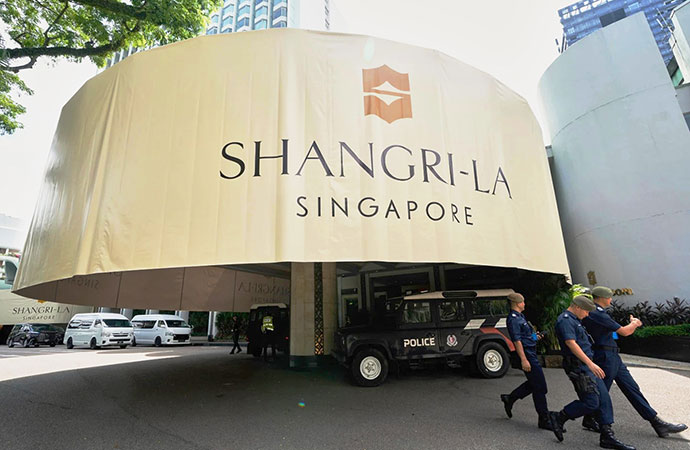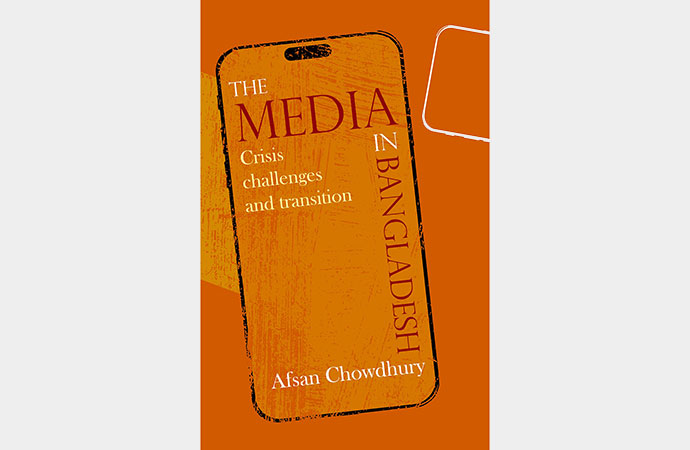Column

Police officials walk past the venue during the Shangri-La Dialogue summit in Singapore, Friday, May 30,2025. Photo: AP/UNB
The just-concluded Shangri-La Dialogue in Singapore, named after the eponymous hotel which is also the dialogue's venue, is an annual security forum that brings together defence ministers and other senior officials from around Asia and beyond the continent. This year's dialogue stood out for what it was not. The dialogue is meant to bring countries together: Instead, it turned out to be a platform that dramatised differences between the West and China, differences that were mirrored in the dispute between India and Pakistan that had turned violent recently.
Now, Shangri-La is a fictional paradise situated in Tibet's Kunlun Mountains where people are almost immortal. And why not? In one account, Shangri-La is a "mystical, harmonious valley, gently guided from a lamasery, enclosed in the western end of the Kunlun Mountains". Shangri-La "has become synonymous with any earthly paradise, particularly a mythical Himalayan utopia - an enduringly happy land, isolated from the world". Beautiful words, but they do not apply to the Shangri-La Dialogue. Although it is held in a magnificent hotel that I frequent, and although Singapore is about as close as it gets to an earthly nirvana in terms of global peace, the dialogue is all about bringing together leaders of nations so that the world does not turn into a dystopia. It succeeds in doing so occasionally, but this year, as I said, was different. The warts came out into the open as America went for the Chinese jugular, and China countered with an adroit kung fu blow to America's self-perception as the default leader of the world.
According to a newspaper report, American Defence Secretary Pete Hegseth mentioned China about 20 times in his speech in which he encouraged other countries in the Indo-Pacific to increase their defence expenditure, buy more American weapons, and protect themselves from what he called the threat posed by China. French President Emmanuel Macron, on his part, "invited the security policymakers and military chiefs attending the forum to think of Russia's aggression in Ukraine as what China might do to Taiwan or the Philippines". The Philippine position was demonstrated by its Defence Secretary, Gilberto Teodoro Jnr, who rebuked a Chinese delegate who had raised the South China Sea issue. In another newspaper report, Senior Colonel Chi Zhang had asked Teodoro "whether Manila was concerned about a proxy war in Asia, citing the United States increasing arms sales to the region and establishing more military bases in the Philippines". "Thank you for the propaganda spiels disguised as questions," Teodoro replied. Clearly, the Western position has its Asian takers.
But the Chinese are not exactly shivering. For the first time since 2019, China's defence minister did not attend the event. What Beijing signified with that dismissive move was that, no matter what Washington and its Asian allies such as the Philippines said at the gathering, and no matter how high the level of their participation was, Chinese defence and foreign policy was set firmly on course. Rear-Admiral Hu Gangfeng, the vice-president of the People's Liberation Army National Defence University who led the Chinese delegation, is a defence scholar reportedly not involved in combat operations or policymaking - two key markers of elite defence preparedness. His brief response to Hegseth's speech dismissed American criticisms as being but "unfounded accusations" that went against the spirit of the dialogue, which is to reduce and not magnify differences. That was that. The Chinese made their point: The presence of their Western adversaries, from the defence czar of America to the president of France no less, made no difference to the Chinese place in Asia. The Chinese think, and for a reason no doubt, that they are on the right, winning side of unfolding Asian history. Americans, for a reason, too, no doubt, think that they are still on the winning side of global history.
India and Pakistan
So do the subsets of the America-China divide. India, which has grown very close to the United States, and Pakistan, which has an all-weather relationship with China, just played out a rehearsal for the main conflict in a four-day armed confrontation in which they went for each other through aerial and artillery warfare. As with military operations generally, gains are exaggerated and losses are minimised by both sides but, whatever the true state of play, its diplomatic resonances were heard clearly at the Shangri-La Dialogue in Singapore.
Bangladeshis would do well to take the gravity of the situation seriously. America, which appears to be washing the blood of the Ukraine conflict off NATO's strategic hands after having abandoned Afghanistan to its Taliban fate earlier, finds itself militarily reinvigorated to challenge China in East and Southeast Asia. India constitutes a buffer against China in South Asia. China, whose military equipment apparently helped Pakistan to hold its own against a militarily superior India (in conventional warfare terms) in the recent conflict, would no doubt be emboldened to contain India through Pakistan in South Asia. There are security communities in Bangladesh that look to India or to Pakistan for strategic salvation - and by extrapolated extension, to America or to China. However, Bangladeshis must not make India/America or Pakistan/China more important to themselves than they are to India/America or Pakistan/China. Bangladesh's sovereignty and territorial integrity demand that it treat great powers (America and China) and middle powers (India and Pakistan) with clinical judgement born out of a keen understanding of balance-of-power politics, both global and regional. Sentimentalism in foreign and defence policy could be fatal.
The Shangri-La Dialogue in Singapore has proved once again that there are no no strategic utopias. There is only strategic realism. There is no Shangri-La on earth. Heaven is another matter, but the point of living on earth is to stay alive.
Enayetullah Khan is Editor-in-Chief, United News of Bangladesh (UNB) and Dhaka Courier.

























Leave a Comment
Recent Posts
Pedaling Through the Mangroves ...
The journey from the bustling streets of Barishal to the serene, emera ...
Why the Interim Government mus ...
Two weeks out from what is expected to be a red letter day in the figh ...
Doesn’t matter who thinks what about Bangladesh deci ..
The Other Lenin
US President Donald Trump said his administration
Govt moves to merge BIDA, BEZA, BEPZA, MIDA